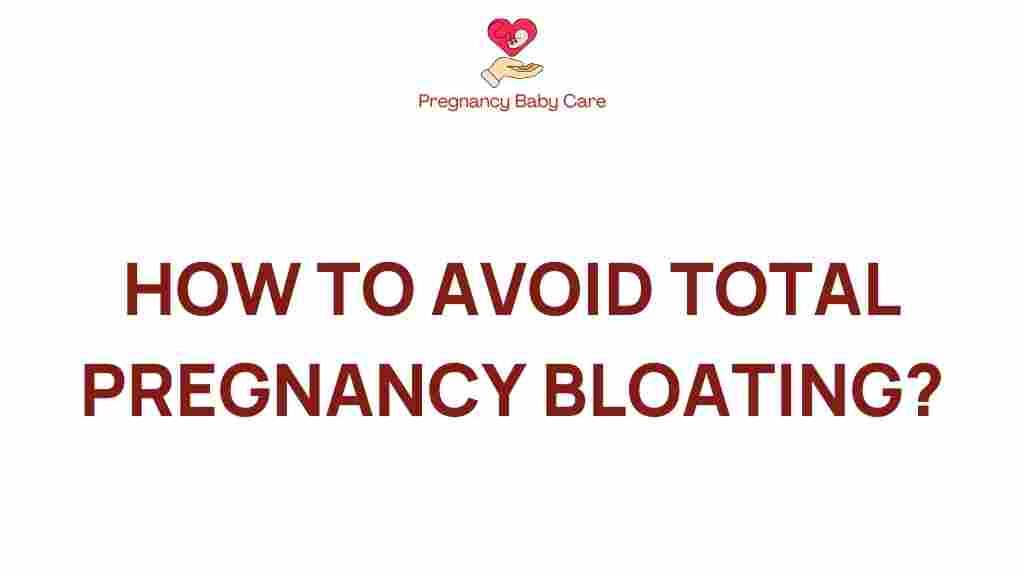Unlocking the Secrets to Avoiding Pregnancy Bloating
Pregnancy is a beautiful journey filled with excitement, anticipation, and numerous changes in a woman’s body. However, one common discomfort that many pregnant women face is pregnancy bloating. This condition can lead to feelings of fullness and discomfort, making it essential for expectant mothers to understand how to avoid bloating and promote overall digestive health. In this article, we will explore effective tips for pregnant women to manage and alleviate bloating, while also focusing on a healthy lifestyle and proper nutrition during pregnancy.
Understanding Pregnancy Bloating
During pregnancy, hormonal changes and the physical growth of the baby can significantly impact a woman’s digestive system. Progesterone, a hormone that increases during pregnancy, can slow down digestion, leading to bloating. Understanding the causes of pregnancy bloating is the first step in managing it effectively.
- Hormonal Changes: Increased levels of progesterone relax the muscles of the gastrointestinal tract.
- Growing Uterus: As the uterus expands, it can press against the intestines, causing discomfort.
- Dietary Changes: Cravings and aversions can lead to poor food choices that exacerbate bloating.
- Fluid Retention: Many women experience swelling and water retention during pregnancy, contributing to a bloated feeling.
Tips for Avoiding Bloating During Pregnancy
Managing pregnancy bloating begins with a proactive approach to nutrition during pregnancy and lifestyle choices. Here are some effective tips to help avoid bloating:
1. Choose the Right Foods
Eating a balanced diet rich in whole foods can help mitigate bloating. Focus on:
- Fruits and Vegetables: Opt for low-fiber options initially, such as bananas, spinach, and carrots, to ease digestion.
- Lean Proteins: Incorporate sources like chicken, turkey, and fish to support healthy growth.
- Whole Grains: Choose whole grains such as brown rice and quinoa, but introduce them gradually.
2. Stay Hydrated
Drinking plenty of water helps with digestion and can reduce bloating. Aim for at least 8-10 glasses of water daily. Consider:
- Infusing water with fruits like lemon or cucumber for added flavor.
- Avoiding excessive caffeine or sugary drinks that can contribute to dehydration.
3. Eat Smaller, Frequent Meals
Instead of three large meals, try eating smaller meals throughout the day. This can help manage discomfort and promote better digestion:
- Plan for 5-6 small meals instead of 3 large ones.
- Include snacks like yogurt, nuts, or fruit to keep energy levels stable.
4. Limit Gas-Producing Foods
Certain foods are known to cause gas and bloating. While you don’t need to eliminate them entirely, consider reducing:
- Beans and legumes
- Cruciferous vegetables like broccoli and cauliflower
- Carbonated beverages
- High-fat foods
5. Incorporate Probiotics
Probiotics can enhance digestive health and help reduce bloating. Foods rich in probiotics include:
- Yogurt
- Kefir
- Sauerkraut
- Kombucha
6. Engage in Light Physical Activity
Staying active is crucial for managing discomfort during pregnancy. Consider:
- Walking or light jogging
- Prenatal yoga to enhance flexibility and relaxation
- Swimming, which can relieve pressure on the abdomen
Managing Discomfort: Step-by-Step Process
Managing pregnancy bloating involves both preventative measures and actions you can take when you start to feel uncomfortable. Here’s a step-by-step process to help relieve bloating:
Step 1: Identify Triggers
Keep a food diary to note what you eat and how your body reacts. This can help identify specific foods that may cause bloating.
Step 2: Practice Mindful Eating
Take your time when eating. Chew food thoroughly and avoid distractions during meals to promote better digestion.
Step 3: Stay Active
Incorporate physical activities as mentioned above. Even a short walk after meals can stimulate digestion.
Step 4: Use Heat Therapy
If you experience bloating, consider using a warm compress or a heating pad on your abdomen to soothe discomfort.
Step 5: Consult Your Healthcare Provider
If bloating becomes severe or persistent, it’s essential to consult with your healthcare provider. They can offer specific guidance or check for any underlying issues.
Troubleshooting Common Bloating Issues
Many pregnant women experience bloating at some point. Here are some troubleshooting tips to help address common problems:
1. Constipation
Constipation can exacerbate bloating. To manage this:
- Increase fiber intake gradually.
- Stay hydrated.
- Incorporate gentle exercise.
2. Hormonal Fluctuations
Hormonal changes can lead to bloating at different stages of pregnancy. To alleviate discomfort:
- Consider relaxation techniques such as deep breathing or meditation.
- Discuss with your healthcare provider if bloating is significant.
3. Food Sensitivities
If you suspect specific foods are causing bloating:
- Eliminate suspect foods for a period and reintroduce them one at a time.
- Consult with a nutritionist experienced in pregnancy nutrition.
Conclusion: Embrace Pregnancy Wellness
Managing pregnancy bloating is an important aspect of ensuring a healthy and comfortable pregnancy. By following the tips for pregnant women outlined in this article, you can take proactive steps to avoid bloating and maintain optimal digestive health. Remember, a balanced nutrition during pregnancy, combined with a healthy lifestyle, will not only help in managing discomfort but also contribute to your overall pregnancy wellness.
For more information on pregnancy nutrition and wellness, consider visiting this resource to explore comprehensive guides on healthy eating during pregnancy.
Ultimately, every pregnancy is unique, and it’s essential to listen to your body and seek professional advice when necessary. Embrace this journey with confidence, knowing you have the tools to manage any discomfort that comes your way!
This article is in the category Pregnancy and created by PregnancyBabyCare Team
